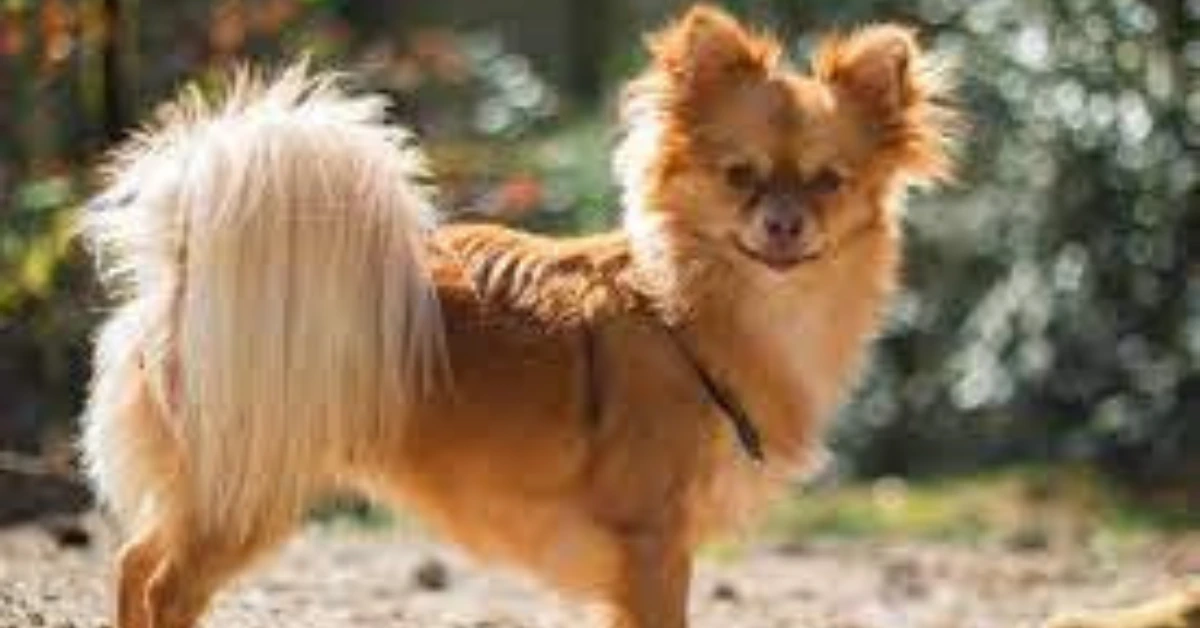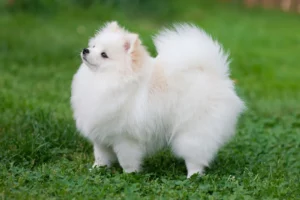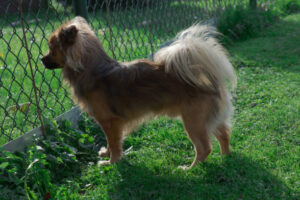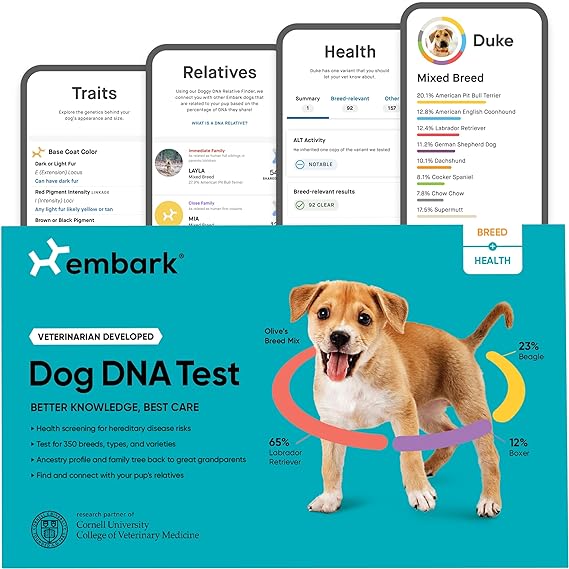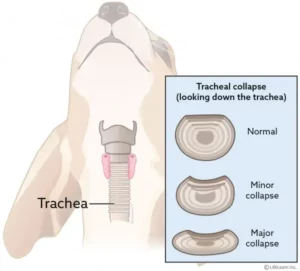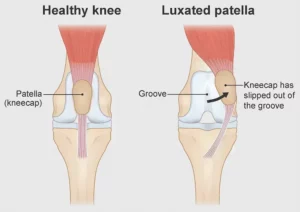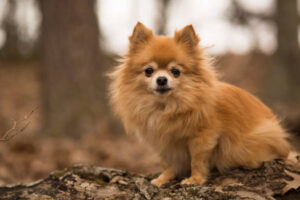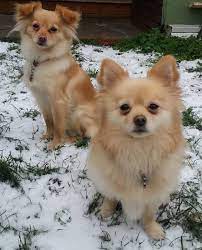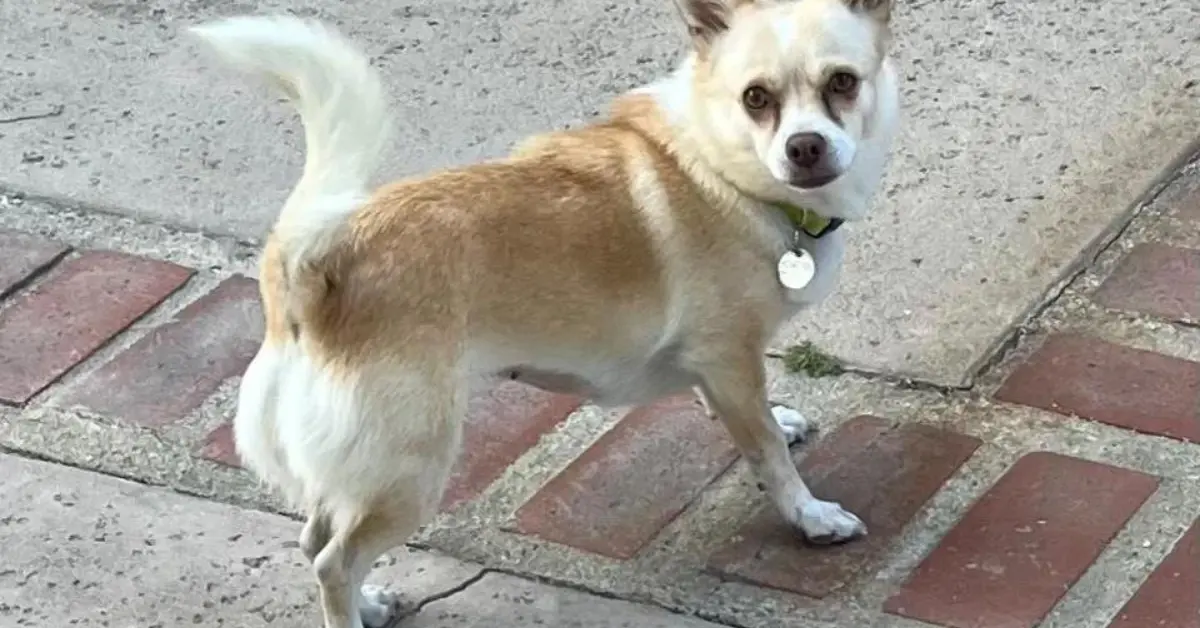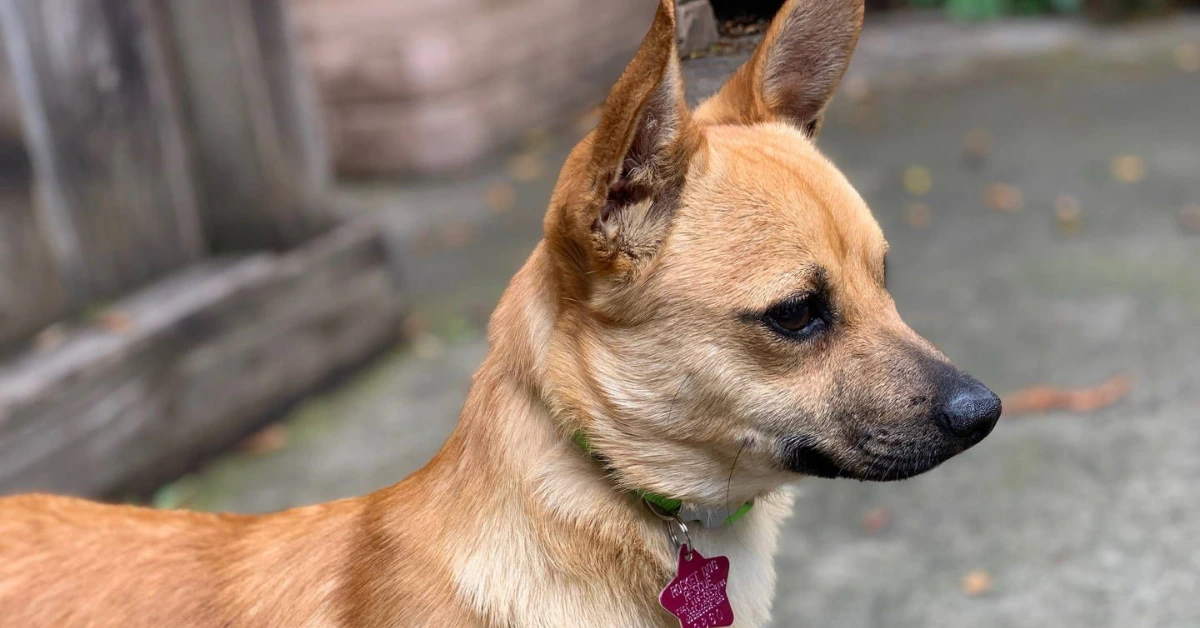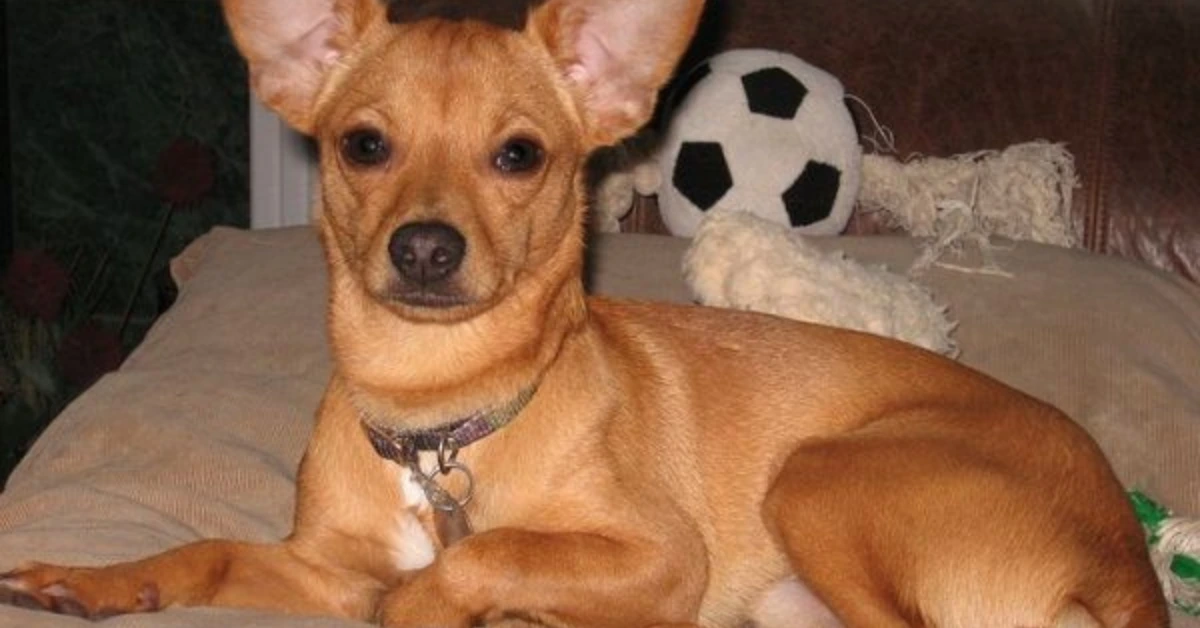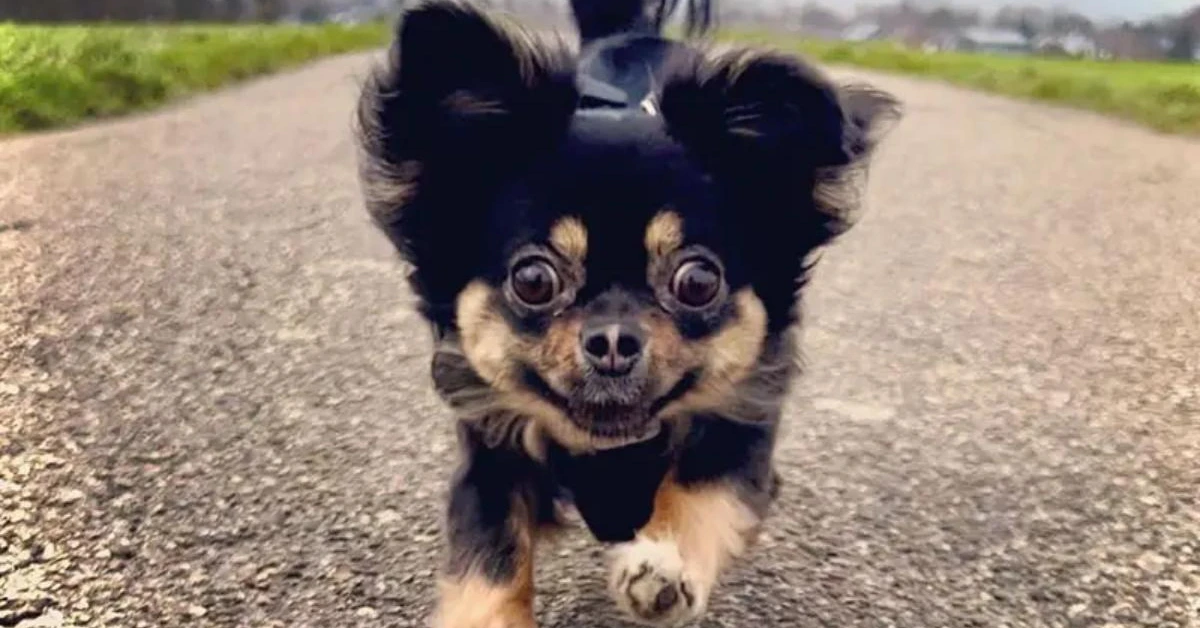Famous for its cuteness, the Pomchi is a small and adorably cute Pomeranian Chihuahua mix. It is stated that these dogs are perfect for people who live in compact spaces in cities.
Pomchis are also regarded to be very easy to train and work out, which makes them perfect for people who aren’t big exercisers.
Pomchi History
The Chihuahua
Although the precise origins of the Chihuahua dog breed are uncertain, numerous theories have been proposed. A widely held belief holds that the Chihuahua is descended from the Techichi, a tiny dog that the ancient Toltec inhabitants of Mexico loved.
Advertisement
A sailor brought two Chihuahuas to New Orleans in 1850, which is when the breed was originally known to exist in the United States.
The breed sprang to prominence in the United States in the early 20th century and is currently among the most well-liked breeds there.
The Pomeranian
A tiny Spitz dog is called a Pomeranian. It is the smallest of the Spitz family and takes its name from the historical region of Pomerania, which is now a part of northern Poland and Germany.
Pomeranians are well-known for being gregarious, energetic, and excellent companions. Despite their diminutive size, they are comparatively robust canines with elongated lives. In the late 1800s, Pomeranians were originally bred in Germany.
Since its initial introduction to American society in the early 1900s, its renown has only increased.
The Pomchi
A Pomeranian and a Chihuahua are crossed to generate the hybrid dog known as a Pomchi. The best qualities of both breeds are inherited by pomchis, who have an alert disposition, playful behavior, and petite stature.
Mixes of Pomeranian and Chihuahua are relatively recent dogs, having first been seen in the US in the 1990s. But because they are loving and require little upkeep, they have gained popularity as pets quite quickly.
The American Kennel Club does not recognize mixes between Pomeranian and Chihuahua.
Pomchi Appearance
Since Pomeranians and Chihuahuas are such dissimilar breeds, it is difficult to anticipate with precision what the appearance of a Pomeranian-Chihuahua hybrid will be.
But most Pomchis get the thick coat—which can be wavy or straight—from their Pomeranian ancestors. They also frequently have the prominent cheekbones and big ears of Chihuahuas.
There are many different colors of Pomeranian Chihuahua mixes, such as black, white, brown, and tan.
Small in stature, Pomeranian-Chihuahua mixes usually weigh six to ten pounds.
They can be six to nine inches tall.
Pomchi Temperament
Pomchis have a vibrant personality and get along well with both other pets and older children. They make wonderful companions because they are usually incredibly devoted and affectionate canines.
Nevertheless, the Chihuahua Pomeranian hybrids also carry over some of the less appealing characteristics of their parent breeds, such as an incessant barker and training challenges.
Because of this, people hoping for a peaceful, submissive companion or those who are looking to become dog owners for the first time are not advised to get Pomeranian/Chihuahua hybrids.
Pomchi Health
The average lifespan of a Pomeranian-Chihuahua mix is 12 to 15 years.
Pomchis are susceptible to the same health issues as their parent breeds, even if they may have some morphological and behavioral characteristics that are inherited from them.
If you want to know what health problems your furry friends may be prone to, we recommend that you speak with your dog’s breeder or veterinarian.
Your dog’s breeder will be aware of any potential health issues that your puppy (mixed breed or not) is predisposed to depending on the health of his or her parents.
If none of these choices are available, you could also conduct a dog DNA test. I’ve utilized the Embark dog DNA test on two of my canine family members. I enjoy how this dog DNA test can identify breeds and detect health issues.
When the test results arrived two weeks later, I was pleasantly pleased by how exact the breed ID was.
Furthermore, the health detection allowed me to learn more about the health issues that my two dogs are prone to and how I may aid to better care for them.
Tracheal Collapse
Imagine that when a dog breathes in, the trachea, the vital tube that carries air from the nose to the lungs, collapses or flattens. It’s a serious condition known as tracheal collapse. These unfortunate puppies can suffer from breathing issues, chronic coughing, and, dare I say it, even fainting.
The worst part is that this illness has the potential to become fatal in extreme circumstances. Prepare yourself, as the small size and delicate necks of our cherished Pomeranian Chihuahua mixes make them especially prone.
Reducing weight and exercising less can help, but in more extreme situations, surgery to restore the trachea may be necessary.
Patellar Luxation
This occurs when the leg locks up due to the patella (kneecap) sliding out of place. Chihuahua Pomeranian mixes, with their petite stature and short legs, are particularly vulnerable to this illness.
The most typical sign of patellar luxation is the affected leg’s lameness. When walking, the Pomeranian-Chihuahua mix may also hold its leg up or sway it to the side. Patellar luxation can result in arthritis and joint degeneration if treatment is not received.
Periodontal Disease
When your dog has periodontal disease, it affects his gums and the bones that support your dog’s teeth. This can lead to missing teeth and other health problems.
Stopping it from progressing requires early detection and treatment. Pomeranian-Chihuahua mixes are especially prone to this issue because of their cute little heads and packed teeth.
Establishing and maintaining a program of routine brushing and dental exams is essential to maintaining the health of your Pomchi and protecting against periodontal disease.
Pomeranian Chihuahua Mix Care
Grooming, shedding level, activity, training, and food are all vital factors to keep your Pomeranian-Chihuahua mix happy and healthy.
Shedding Level
The type of coat on the Pomeranian-Chihuahua mix determines the answer to this query.
- Your Pomchi is more prone to shed if it has a long, thick coat.
- Your Pomchi will shed less if its coat is short and silky.
In either case, frequent brushing of their coat will assist in minimizing shedding.
It is not thought that mixtures of Chihuahua and Pomeranian breeds are hypoallergenic canines.
Grooming
The Pomeranian-Chihuahua hybrid is renowned for having an opulent, thick coat. Even while they don’t need as much maintenance as some other breeds, it’s still vital to brush their coat regularly to avoid tangles and matting.
To keep the coat of the Pomeranian-Chihuahua mix looking nice and clean, you should cut it every few months.
You will need The following supplies for at-home dog grooming: a high-quality dog brush, scissors, and clippers.
Diet
Due to their diminutive stature, Pomchis are vulnerable to hypoglycemia, which, if left untreated, may be fatal.
Therefore, rather than feeding Pomeranian/Chihuahua mixes one big meal a day, they should be fed several little meals throughout the day.
Furthermore, fresh water should constantly be available to Chihuahua Pomeranian Mixes, and they shouldn’t be allowed to get dehydrated.
It is crucial to choose a special premium food for little breeds when buying food for a Chihuahua-Pomeranian mix.
Training
A few things you need to consider when training a mixed Chihuahua and Pomeranian.
To begin with, Pomchis can have separation anxiety and are extremely loyal to their owners. Chihuahua Pomeranian mixes should receive lots of love and care, and if they are left alone for long periods, they should be trained to live in crates.
Secondly, Pomchis originated from the crossbreeding of two hunting breeds. These dogs may attempt to chase tiny creatures due to their intense prey drive. You should socialize your Chihuahua Pomeranian mixes from a young age onwards to teach them how to behave among other animals without being aggressive.
And finally, talkative dogs are a characteristic of Pomeranian-Chihuahua hybrids. When a dog is younger, this characteristic might be adorable, but as it gets older, it might irritate the dog. It’s critical to teach Pomchis to curb their excessive barking. You can train Pomeranian-Chihuahua mixes to be good boys/girls, joyful to have around other dogs, with patience and consistency.
Exercise
The Chihuahua Pomeranian mix, like its parent breeds, is a lovely balance of low activity and low exercise requirements. But don’t fall for it! A Pomchi still yearns for an hour or more of exercise every day, but at least thirty minutes is what she needs. If you neglect your cute Pomchi’s exercise needs, they may become frustrated and engage in destructive behavior.
Past the routine daily strolls, these endearing mixes long for chances to run around and have fun. If you’re lucky enough to have a backyard, you’re in a beautiful place. But fear not if you must live in an apartment! Frequent outings to the dog park or daycare will keep your Pomchi happy.
Pomeranian Chihuahua Mix The Right Choice For Me?
Pomchi And Other Animals
Although Pomeranians are typically amiable dogs, they can be food and toy-possessive. Conversely, chihuahuas may not get along with other animals and are frequently suspicious of strangers.
Because Pomeranian Chihuahua mixes normally inherit the best traits from both breeds, they are frequently gregarious and well-mannered dogs. Pomchis can learn to get along with cats and other dogs with the right socialization.
It’s crucial to socialize Pomchis from a young age since, as said earlier, they still have the potential to be violent.
Doesn’t Get Along With Small Kids
Mixes of Pomeranian and Chihuahua are not good pets for households with little children or toddlers.
These dogs are prone to becoming highly agitated and irritable, and because of their small stature, they are susceptible to accidental injuries from children.
Pomchis also tend to bark and, if untrained, can become yappy and bothersome. Take into consideration a different breed entirely if you’re searching for a pet that will get along with little children in your home.
Perfect For Apartment Living
Chihuahua Pomeranian mixes are happy to curl up on the couch with their owner because they don’t require a lot of space to romp around. Pomchis are a great option for those who live in apartments or don’t have a lot of outdoor areas.
Pomeranian Chihuahua Mix Male vs Female
The male and female Pomeranian-Chihuahua mixes differ in a few morphological ways. Pomchi males weigh between 4 and 9 pounds on average, which makes them slightly larger than females. Weight range for females: 3 to 7 pounds.
In addition, males’ snouts are longer than females’. Male Pomeranian-Chihuahua mixes tend to be more autonomous than females in terms of personality. Females are typically more clinging and loving.
Quick Breed Summary Table
| Pomchi Traits | |
| Size: | 6-9 inches |
| Weight: | 6 to 10 pounds |
| Lifespan: | 12 to15 years |
| Coat: | Long or short, dense or thin, single or double. It all depends on which parent they take after |
| Color: | awn, cream, tan, chocolate, sable, blue, black, or a mix of these colors. Mixes of black and tan or blue and tan are common. |
| Do They Shed: | Only seasonally in spring and fall |
| Temperament: | Affectionate, sassy, and alert |
| Intelligence: | Intelligent but stubborn |
| Socialization: | Will need lots of socialization with strangers and pets |
| Destructive Behavior: | professional barker, and may also chew if left alone |
| People Skills: | Affectionate to his owner But not with strangers |
| Good with Children: | The dog can get along with kids, but not very young children |
| Activity Levels: | Low to medium activity levels. The dog needs 30 minutes of walking daily. |
Here is a video of cute Pomchi:
YOU MAY ALSO LIKE:
Chihuahua Corgi Mix: Chigi A Complete Guide
Chihuahua Poodle Mix: Chi-Poo, A Complete Guide
Italian Greyhuahua-A complete guide
Advertisement

